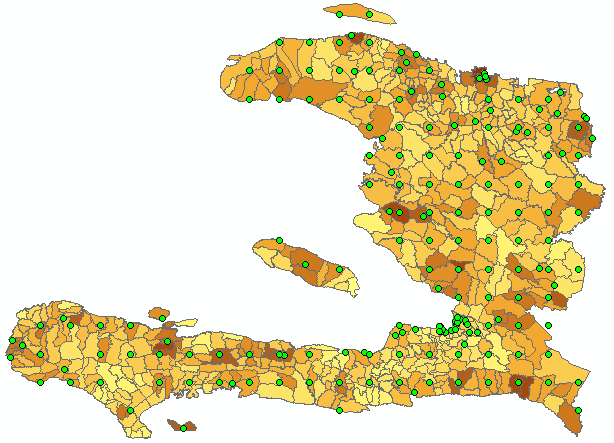Optimizing Decentralized Humanitarian and Public Health Logistics Systems

Natural disasters, such as the Haiti earthquake of 2010, and public health emergencies, such as the U.S. influenza pandemic of 2009-2010, highlight the complications inherent in decentralized supply chains – those in which multiple stakeholders take actions that impact the overall system. In Haiti, for example, the sheer number of responders – government, military, private and nongovernmental agencies – the urgency of the situation, and the crippled infrastructure all complicated response efforts. Proactive supply chain engineering can help prevent inefficiency, redundancy and missed opportunities in such scenarios.
 |
| Optimized facility locations for cholera treatment in Haiti. |
Jessica Heier Stamm’s research interests include the development of quantitative models and algorithms to design and improve humanitarian relief and public health logistics systems. In particular, she uses operations research and game theory tools to analyze systems in which decisions about system control are made in a decentralized way. This work is addressing two central research questions:
- What is the impact on system effectiveness as a result of decentralization?
- How can systems be designed to mitigate adverse effects of decentralization?
Answers to these questions have direct implications for designing and managing supply chain systems that support health. Heier Stamm’s group was the first to synthesize literature describing applications of game theory modeling to humanitarian operations. Her group’s work on theoretical properties of decentralized humanitarian logistics systems led to new performance bounds and coordination mechanisms for improving decentralized systems.
Pedagogical research
Heier Stamm’s pedagogical research is synergistic with her disciplinary research. She aims to increase current knowledge regarding students’ understanding of and interest in ways that industrial engineering makes a difference in people’s lives. This work is paving the way for educational strategies that improve recruitment and retention for engineering students, particularly those from groups that are historically underrepresented in engineering.
Recent projects and interests
- Engage stakeholders in the Kansas public health system to optimize public health disaster preparedness and response in the state
- Model impact of coordination on facility location decisions for Haiti cholera response and Nepal earthquake response
- Study theoretical properties of decentralized humanitarian logistics systems
- Develop new performance bounds and coordination mechanisms for improving decentralized systems
- Develop educational strategies that increase recruitment and retention for engineering students, particularly those from underrepresented groups